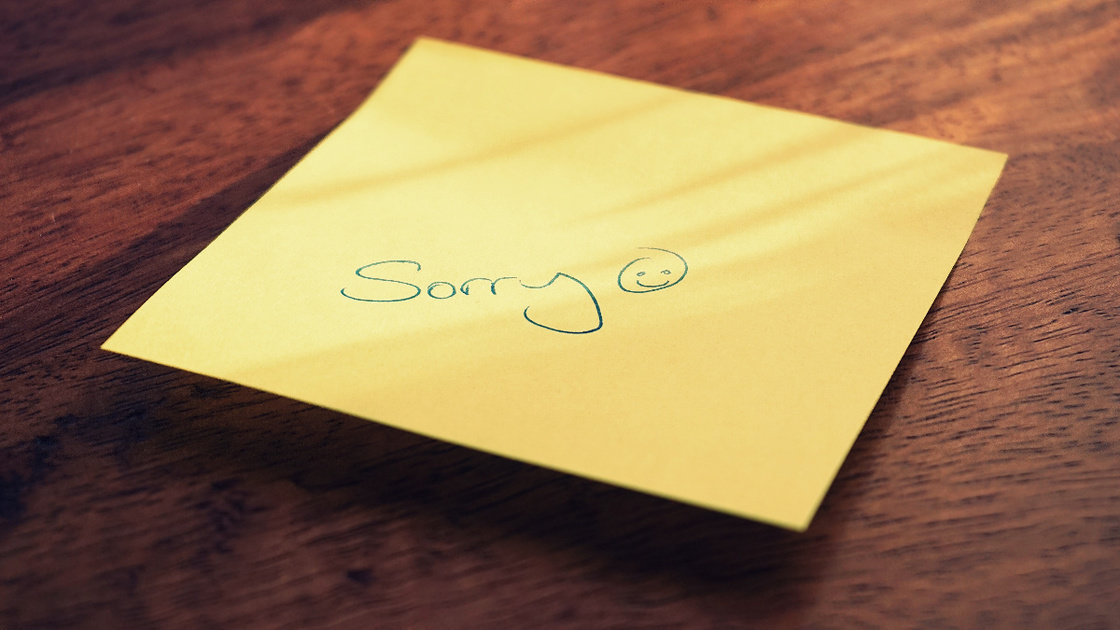
We are all human and make mistakes. And, while ‘a mistake is just a mistake”, when someone is hurt by our error– even inadvertently- we are accountable. The Torah requires us to take responsibility -which means apologize and make repair.
For most of us, this is not an easy thing to do – especially if it is to our parents or siblings. We don’t like confrontation and are afraid of the reaction of the other person. Yet when we overcome our fear and do apologize, we often experience relief. Though we feel bad about our behavior and perhaps the reaction to our apology, we feel good about apologizing, fixing our mistake, and making up our mind to do better in the future. At the end of the day, it feels good to have done the right thing.
Most of us have dealt with more than one perfunctory “I’m sorry” in our lifetime. The author, eyes downcast, mumbles his words hurriedly. Often the apology is delivered in a flat, emotionless tone of voice which reinforces our suspicion that the apology is forced. This kind of apology leaves us feeling unsatisfied and even resentful to the apologizer who wants to get something for nothing. Seriously, can one muttered word cover all the hurt?
An effective apology is specific: “I am sorry I ignored you at the Shabbaton during lunch.”
But the verbal apology is insufficient: it must also include repair. Something to the tune of: “I am committed from now on to include all my friends at school events” spells out our intention to do better. And, of course, we have to do whatever we’ve said we would do.
Because, an apology works when there is repair. It is pointless and ineffective to apologize to your mother for tantrumming instead of talking if you continue to tantrum the next day. We can only take an apology seriously if the person shows he is sincerely sorry enough to change his ways.
The Apologizer
Apologizing is certainly the right thing – but, it’s not always the easy thing. A true apology takes self-awareness, thoughtfulness, and courage. It shows that we are aware of our behavior and how it impacts others. It takes lots of thought to figure out the best way to approach the person we have hurt. And, it takes tremendous courage to admit our mistakes and face a person who may be quite angry at us- and may not be afraid to show it.
Doing the apology right is a skill – one that can be learned and developed. It takes a few simple steps. An apology begins with determining a good time to talk. It should not be done on the fly, and preferably not on the phone. It is best done face to face, with eye contact. The apologizer begins with stating her apology and what she is apologizing for. She should not make excuses, be defensive, or explain how it wasn’t really so bad. She also should include how she proposes to repair both the mistake and the relationship.
Shevi tells Rivki that she is sorry that she laughed at Rivki’s comment in the pizza store. She refrains from pointing out that everyone else at the table was laughing which made it hard to control the laughter- because that would be excusing herself. She assures Rivki that she would make sure this would not happen again by avoiding groups that she feels are a bit light-headed. She also tells Rivki that she really wants to be her friend and invites Rivki for Shabbos.
The apologizer also has to have empathy for her victim- which means to feel what it’s like for the other person. So, even though Shevi could laugh good-naturedly were she the one teased at the pizza store, she works on understanding that Rivki cannot. She knows it’s important to understand Rivki’s point of view in this case. When we apologize, we apologize for what matters to the other – not what matters to us.
Because we have the best of intentions, we may fantasize [like the character in this story] that our apology will be accepted graciously, and all will be well. But, in real life, that does not always happen- for reasons described below. So, what happens when our apologies our spurned – or even serve as fuel for the anger of the other?
Rivki is livid at Shev’s apology. “Sure, nice you can apologize now, but where were you then?” she hisses. “Do you have any idea how hurt I felt? Do you know what it’s like to have everyone laugh at you? Why should I forgive you now after I cried all night?”
When faced with such an onslaught, we tend to become defensive and justify ourselves. “Why am I getting yelled at? I am the good one – the one who is apologizing!” Because it is crushing to listen to pain, especially when we are accused of causing it, we often look for what part of the criticism is inaccurate. In our mind we may think something like “Rivki, you are really being overly-sensitive. We were all just joking around.” But, it is so important to just stay with your purpose – your apology- and squelch those feeling of blame or counter-attack. Remember, it is not important to respond, but rather to listen differently so we can learn about the other’s point of view.
The Wounded
You have been hurt, and at the very least deserve an honest, sincere apology with promise of repair. When it is possible, welcome the apology and move on. We want people in our lives, and someone who apologizes is a good candidate.
But, forgiveness is an active process, not a passive one. It should not look like you are conceding in defeat, but rather that you are a happy participant in the process. It should be your willingness to accept amends – but never your fear of confrontation. If you are dissatisfied with the apology or feel seriously injured say so. It is your right – and in fact you owe it to yourself- to clarify what has been done to you. In addition, you want to work through what occurred so that you can resume a healthy, satisfying relationship. Just pretending that you are okay is a recipe for disaster and will have a negative impact on your relationship.
Though you and your friends have probably gone through the all too familiar routine of “Mochel me? Thanx” before Yom Kippur, forgiveness is not automatic. You may have been too hurt over too long a period of time to let go of the pain. You might not feel like being friendly right away. Or, if the person makes no effort to change, you may not want to forgive just now. Just because someone apologizes, it doesn’t mean you have to be friends. If possible, it is polite to acknowledge and accept the apology – but, anything more is up to you.
Do’s and Don’ts
-Do apologize as soon as possible. You don’t want to wait to Yom Kippur and run the risk of the situation deteriorating.
-Do give the other person space. If she doesn’t feel ready to talk it over or accept your apology, try again in a few days. She may just need more time.
-Do apologize in a private place so that neither of you have to suffer embarrassment.
-Do stay on topic – your apology. No need to get into an attack or “I did this because you…”
-Don’t expect the other person to forgive you right away. You may have caught her by surprise, or maybe she just needs to process it. Be willing to revisit the apology after a while.
-Don’t forget the repair. Words are important, but action is needed here too.
-Don’t pursue the apology if the person is over-the-top furious, even abusive. If the person is that angry, talk to an adult about the best way to proceed.
-Don’t beat yourself up if you get that angry reaction and fail to make any progress. Remember that you are doing the best you can in this situation and feel good about your efforts towards shalom.
It takes a big person to apologize and a real mensch to accept the apology graciously. Though you are not yet adults, it is never too early to strive for greatness. May HKBH give us all the koach to do the right thing and the wisdom to know what that is.
Reprinted with permission from Binah Magazine.
 Previous
Previous

